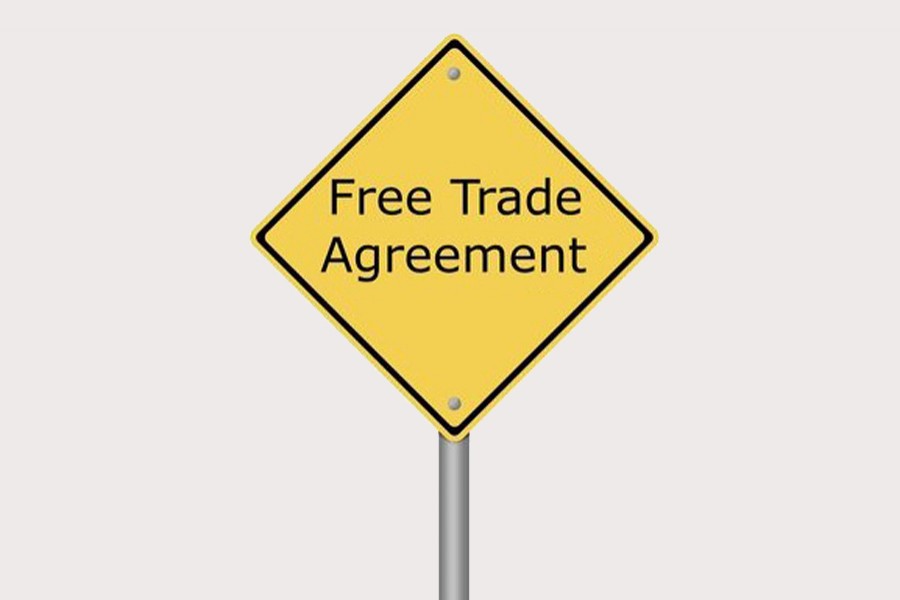Japan has shown its reluctance to take forward a proposal by Bangladesh for conducting a joint feasibility study on the possibility to sign a free trade agreement (FTA) between the two countries.
They would not advance the initiative unless their local businesses feel the need for an FTA with Bangladesh, officials said.
The FTA is a policy decision in Japan and the issue will only arise based on the need of the business circle there, they added.
Bangladesh in November last year requested Japan to conduct a joint feasibility study for signing FTA.
Commercial counsellor of Bangladesh to Japan Dr Ariful Haque and counsellor (political) Sheikh Farid late last month met Japan foreign ministry's deputy director Chisako Nishitani and assistant director Anri Uno to get the update on the proposed joint feasibility study.
Mr Haque has recently updated the ministry of commerce in Dhaka about the responses he received at the meeting.
"…it seems difficult to have feasibility study as of now because they need to consider it with the requests from business communities and economic effect of FTA," he wrote, referring to Japan foreign ministry officials' views.
He also wrote that before taking a policy decision on FTA, it seems, there is no scope right now to conduct a feasibility study.
"At this initial stage, this issue may be raised and discussed with the Japanese stakeholders in appropriate forum like Japan-Bangladesh public private joint economic dialogue," he suggested.
Additional secretary of the ministry of commerce Shahidul Islam told the FE that the ministry is yet to receive a formal response from the government of Japan over the proposal.
He said the issue may be raised in the meeting of the Japan-Bangladesh public private joint economic dialogue to pursue the private sector towards signing an FTA.
However, the Japan-Bangladesh Chamber of Commerce and Industry (JBCCI), a 230-member trade body, has taken a move to conduct internal survey over its members to get their opinions on the benefit of signing an FTA or any other similar trade or economic agreement.
"There might be a scope of signing FTA, or PTA (preferential trade agreement) or EPA (economic partnership agreement)," said JBCCI general secretary Tareq Rafi Buiyan Jun.
But before that, the survey on the Japanese companies doing business here and the Bangladeshi companies working with Japanese companies will help understand the trade situation, he said.
Mr Jun also said that the survey may help the governments take decision on conducting a joint study and launch proper initiatives including the formation of a working group for further discussion.
The JBCCI secretary further said due to the increase in Japanese companies in the special economic zones, the scope of economic partnership agreement may also be explored.
"We must start now the process to sign an agreement through conducting a study as doing business without having any tariff preference deal may become difficult for Bangladesh after its graduation to upper level," he added.
Country representative of Japan External Trade Organisation (JETRO) Yuji Ando told the FE that some Japanese companies feel the need for an FTA or extension of existing generalised system of preference (GSP) facility.
"If the tariff-free access to Japan is not available, relocation (of factories) from Bangladesh might take place to other countries having trade agreements (with Tokyo) like that of Vietnam, ASEAN, and India," he wrote, replying to an e-mail.
The JETRO chief also said that as Japanese companies in Bangladesh export items and products mainly to Japan, there is a need to see the balance of trading items between the two countries carefully which would help understand whether the FTA or GSP extension would be better to go to the next level.
JBCCI vice president M Jalalul Hai also stressed the need for signing an FTA or any such agreement when the number of Japanese companies from consumer level to engineering level has been increasing in the country.
"Both export and import activities will be benefited from it as many Japanese and Bangladeshi firms are now engaged and will be engaged in development activities from metro rail to power and port development," he told the FE.
The Bangladesh Trade and Tariff Commission (BTTC) had earlier studied the pros and cons of signing such a deal with Japan.
The BTTC study found that signing of an FTA with Japan will be immensely beneficial for Bangladesh in the post-LDC era when the country would lose trade concessions globally.
Presently, all but a few Bangladeshi products enter the Japanese market with duty-and quota-free facility, but that would not last long after Bangladesh's graduation from the least developed country status by 2026.
In 2018-19, Bangladesh imported goods worth US$1.8 billion from Japan and exported goods worth $1.3 billion there, which is over 3.0 per cent of the country's total external trade.


